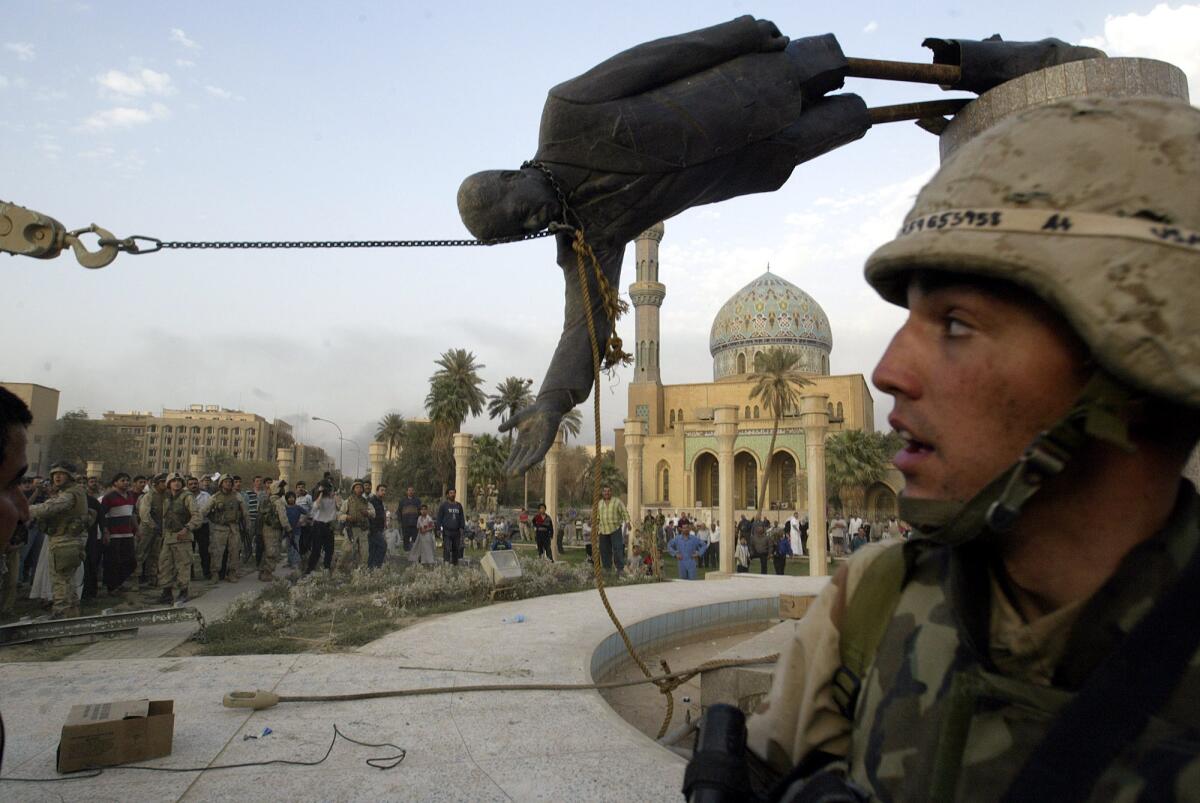Op-Ed: Torture, false information and the Iraq war

Iraqi civilians and U.S. soldiers pull down a statue of Saddam Hussein in downtown Baghdad on April 9, 2003.
The Senate will soon consider an amendment by Sens. John McCain (R-Ariz.) and Dianne Feinstein (D-Calif.) that would prevent torture from being used during interrogation by any U.S. personnel. This amendment stems in part from the release in December of the Senate’s report on CIA torture, which stirred an intense debate about the efficacy of this method — particularly whether information sought from suspected terrorists could be gleaned using other sources or techniques.
Less attention has been paid to the risks posed by fabricated information obtained via torture. The Senate’s report detailed two cases in which suspects tortured by the CIA sent agents down false trails.
And I have personal experience with this problem. I remain haunted by one instance when fabricated information helped lead to the deaths of thousands of Americans.
Although the information came from a rendition case in which the United States transferred a detainee to a foreign country (reportedly Egypt), the episode is a cautionary tale for why U.S. policymakers should never allow torture nor rely on information acquired from it.
In 2002, I was the chief counsel for the Democratic members of the House Committee on Foreign Affairs. At the time, the committee was considering legislation authorizing the use of force against Iraq. The central justification raised by the George W. Bush administration revolved around Iraq’s suspected and continued possession of weapons of mass destruction.
In the fall of 2002, the committee received a briefing on Iraq from the intelligence community. I remember thinking that almost all of the details presented to us by the Bush administration were old and familiar. It was concerning but not alarming. In fact, I felt a growing sense that there was no new information to suggest that Iraq was a real threat, and certainly not one that could justify U.S. military action.
Then the CIA briefer dropped a bombshell. With the great confidence that was this briefer’s hallmark, he stated that Iraq had provided chemical and biological weapons training to Al Qaeda members.
I remember the jarring impact of this revelation. I thought to myself that if we knew that, perhaps there was even more information we didn’t know, including a possible transfer of such weapons to Al Qaeda. I looked over to one of the senior staffers who shared my reaction: This was serious.
I had attended hundreds of briefings in my 10 years of working on Capitol Hill, but very few resulted in such an immediate change in my thinking or had such an emotional impact. Until that day, I had been dubious that the regime of Saddam Hussein would cooperate in any meaningful way with jihadists. Afterward, when lawmakers or staffers asked me about my own view, I would point to this intelligence as an important consideration. And I believe that lawmakers very much took the CIA briefer’s dramatic revelation into account when deciding whether to vote to use military force against Iraq.
We now know that this information was obtained from a single source. According to the New York Times, the individual, Ibn al-Shaykh al-Libi, was captured in Pakistan, transferred to a military base in Afghanistan and then rendered to authorities in Egypt, where he claims he was tortured. Indeed, even at the time, his statements on Iraq were disputed within the intelligence community, and the Senate report on prewar intelligence indicates that no corroborating evidence was ever found. Once back in U.S. custody, Libi recanted his statements, and the CIA withdrew intelligence based on these remarks.
I am not writing to re-litigate the reasons we went to war with Iraq. And I recognize that this information was coerced by a foreign intelligence service, not by the CIA.
But we need to remember that nearly 4,500 U.S. service members lost their lives in a conflict that was justified, in part, using unreliable information obtained via torture. Hundreds of thousands of Iraqis also lost their lives. And we are still dealing with the ramifications of our intervention there.
People will continue to debate the value of the information gained via torture during the Bush administration. What I know for sure, however, is that information coerced by using torture can lead to not only wasted resources and bad foreign policy decisions but also to tragic consequences, including the loss of life among men and women serving in uniform. We cannot allow that to happen again.
David Abramowitz served as chief Democratic counsel to the House Committee on Foreign Affairs from 1999 to 2009 and is vice president for policy and government relations at Humanity United.
Follow the Opinion section on Twitter @latimesopinion and Facebook
More to Read
A cure for the common opinion
Get thought-provoking perspectives with our weekly newsletter.
You may occasionally receive promotional content from the Los Angeles Times.










